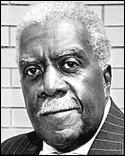Otis Cowart, Jr., and CORE
In 1963, Otis Cowart helped lead a successful boycott of a local store known for its discriminatory hiring process.
When W.T. Grant’s variety store in Niagara Falls, NY was boycotted during the civil rights movement, 25-year-old Otis Cowart, Jr. emerged as a prominent community leader and activist.
Cowart was born in Andalusia, Alabama and raised in Niagara Falls. He returned to his hometown after graduating from Wilberforce University in Ohio with a degree in Business Administration. He was president of the local chapter of the Congress of Racial Equality--known as CORE.
CORE “promoted hiring equality and immediate action when confronting cases of hiring discrimination. Believing that unequal hiring practices existed at [W.T. Grant’s], Cowart and other CORE members conducted a four-day survey of the store at 2116 Main Street.”
The survey revealed that many African Americans had unsuccessfully applied to work at W.T. Grant’s. They also shopped at the store in large numbers and spent a lot of money there. However, there was only one Black employee who worked in the warehouse.
Cowart told manager Frank Carmichael about these results and “stressed that the store should hire five Blacks within the next six months or face picketing.” He added that “CORE’s picketing demonstrations would be nonviolent and that they would not prevent store patrons from entering and exiting the store.”
When W.T. Grant’s failed to meet CORE’s demands, about 25 people picketed in front of the store. A week later, 100 people showed up to picket. The demonstrations began on August 28, 1963, the same day as the March on Washington.
Cowart coached the demonstrators and communicated with store officials and the press. Until CORE’s demands were met, he stated, the protests would last until Christmas and beyond. Other stores would also be targeted if hiring practices didn’t improve in the city.
“In response, […] W.T. Grant[’s] issued a published statement in which they declared that [the company] was for equal opportunity and hiring equality but that they refused to hire strictly based on race, which they considered discriminatory and contrary to sound personnel policy.”
Disgruntled by this stance, Cowart held a community rally at Trinity Baptist Church. He advised attendees not to cross the picket line and shop at the store, and to permanently close their charge accounts as soon as their bills were paid.
After three long weeks of picketing, “a settlement was reached, in which W.T. Grant[’s] agreed to ensure that Blacks were given equal employment opportunities at their store.” Ramona Bradberry was the first African American clerk hired at the store.
In 1976, W.T. Grant’s went out of business and stores across the country closed.
Cowart remained active as a community leader. His 2009 obituary observes that he was accomplished in the areas of business, government, neighborhood development, and, of course, civil rights.
Hope L. Russell, Ph.D.


